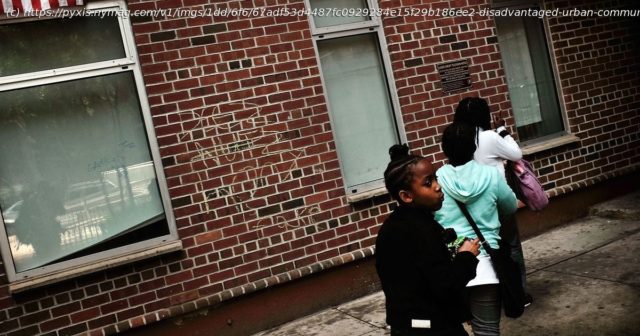Activists protesting abusive policing in the wake of George Floyd’s death want to “defund the police.” But bringing justice and peace to disadvantaged black communities will require more public investment than we can divert from police budgets.
In the wake of George Floyd’s murder by torture, tens of thousands have taken to the streets of America’s cities to demand a radical remaking of law enforcement in their country.
The leaders of this movement have rejected mere reforms to police training or disciplinary procedures as inadequate to the scale of injustice. Rather, they contend that our nation’s approach to crime deterrence must be reimagined, and its budgets rebalanced. In many cities, police departments command more municipal resources than health care, housing, youth programs, and workforce development combined — even as those police departments post abysmal homicide clearance rates, usher teenagers into the carceral system for minor offenses, and routinely violate nonwhite residents’ civil rights.
Protesters deem this state of affairs unacceptable. They want their government to foster public safety in disadvantaged communities. But they do not want it to subject nonwhite people to routine harassment and violence by armed agents of the state, nor to funnel them into a cruel and unusual prison system. Therefore, racial-justice advocates have called for transferring resources from the police to alternative forms of community-based violence prevention and conflict mediation, as well as to social programs that address the root causes of crime. They have summarized this vision with the slogan “defund the police.”
This movement’s accomplishments are already considerable. And its aims are just and reasonable. America’s mode of law enforcement is more punitive, violent, and democratically unaccountable than that of any other advanced democracy, while our social spending is aberrantly stingy. Bringing justice and peace to disadvantaged communities throughout our country will undoubtedly require much more than “police reform.”
The activists and community organizers who’ve rallied behind “defund the police” are engaged in discrete struggles over fiscal priorities across a wide range of cities. As such, their focus on contesting police departments’ outsize share of municipal budgets is appropriate. But the fight must not end there. We cannot provide disadvantaged communities with the social resources they deserve — nor, in all likelihood, the social resources necessary for guaranteeing their safety in the absence of conventional policing — merely by reallocating existing public funds. Rather, doing so will require massively increasing overall public spending on these communities. If the end result of the present agitation is to reduce funding for police services, without increasing overall social investment, then we will have made little progress towards becoming a nation whose policies affirm the value of black lives.
And in the present context of widespread fiscal crisis, this outcome is more than possible. For these reasons, massive federal relief for cities today, and durable investments in social welfare and public employment tomorrow, must be understood as racial-justice issues. To “defund the police,” we must refund the social state.
Every year, the United States spends roughly $220 billion on punishing its people. Police forces account for around $115 billion of that sum; the rest goes to maintaining the planet’s most populous prison system. No state in world history has ever directed so much wealth toward arresting and caging its residents.
And yet, if the U. S. shuttered all of its police departments and penitentiaries tomorrow, the resulting savings wouldn’t be nearly enough to provide all Americans with the kind of social welfare state that their counterparts in Western Europe enjoy — nor the one that the leadership of the civil-rights movement thought necessary for securing the safety and social equality of black communities.
The movement to “defund the police” has yet to produce a comprehensive, national blueprint for using social investments to liberate nonwhite communities from their present reliance on law enforcement. But in 1967, Martin Luther King Jr., A. Philip Randolph, and Bayard Rustin drew up an agenda for realizing similar aspirations. In “A Freedom Budget for All Americans,” the civil-rights leaders laid out a vision for fortifying black Americans’ (nominal) legal equality by undergirding it with a set of universal economic rights. The budget called for guaranteeing jobs and “decent and adequate wages” to all who are willing and able to work; a “decent living standard to those who cannot or should not work”; “decent medical care and adequate educational opportunities for all Americans”; “decent homes for all Americans”; and environmentally sound development for the nation as a whole, among other things. (Scholars and activists affiliated with Black Lives Matter have voiced similar demands.)
In the Freedom Budget’s executive summary, Randolph and Rustin explicitly framed their economic agenda as a nonpunitive means of crime deterrence, writing, “The breeding grounds of crime and discontent will be diminished in the same way that draining a swamp cuts down the breeding of mosquitoes.”
At the time, the budget’s authors estimated that realizing these aims would cost about $1.5 trillion over a decade in today’s money. But for a variety of reasons — such as explosive inflation in the costs of health care, housing, and higher education over the past half-century — this appears to be a profound underestimate.
In 2018, the Center for American Progress (CAP) released a proposal for a narrowly targeted version of the federal jobs guarantee that King sought.






